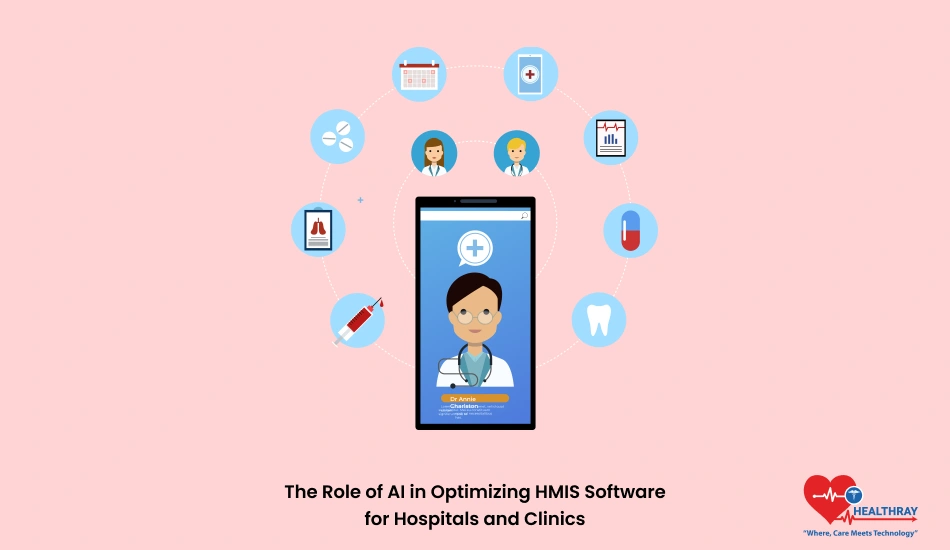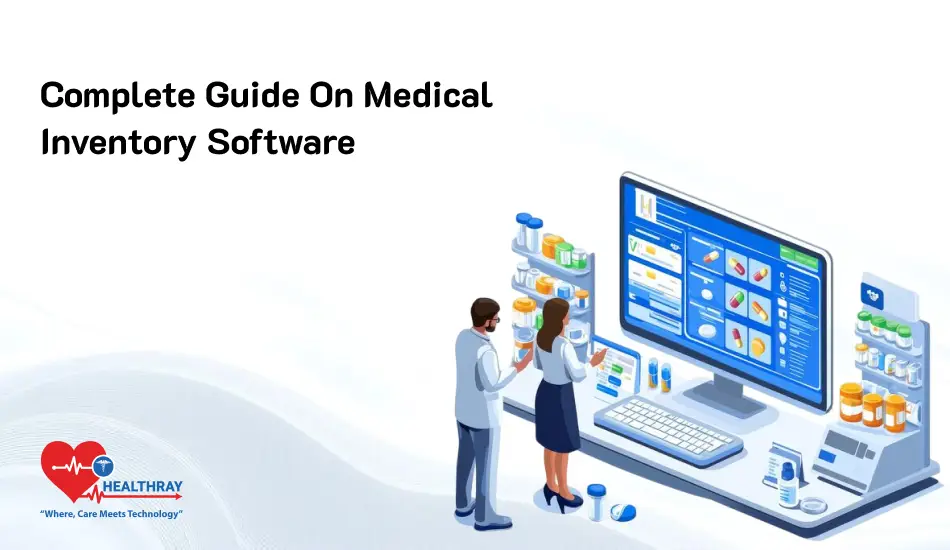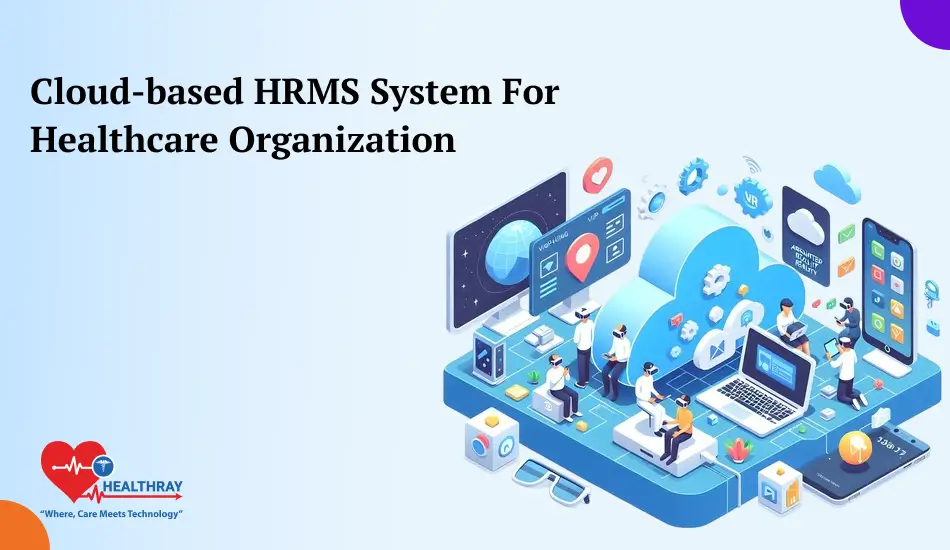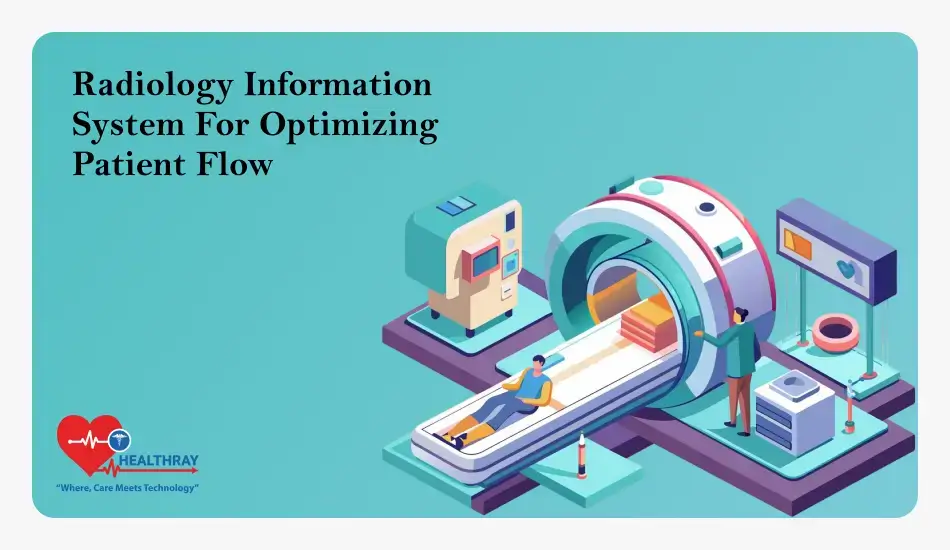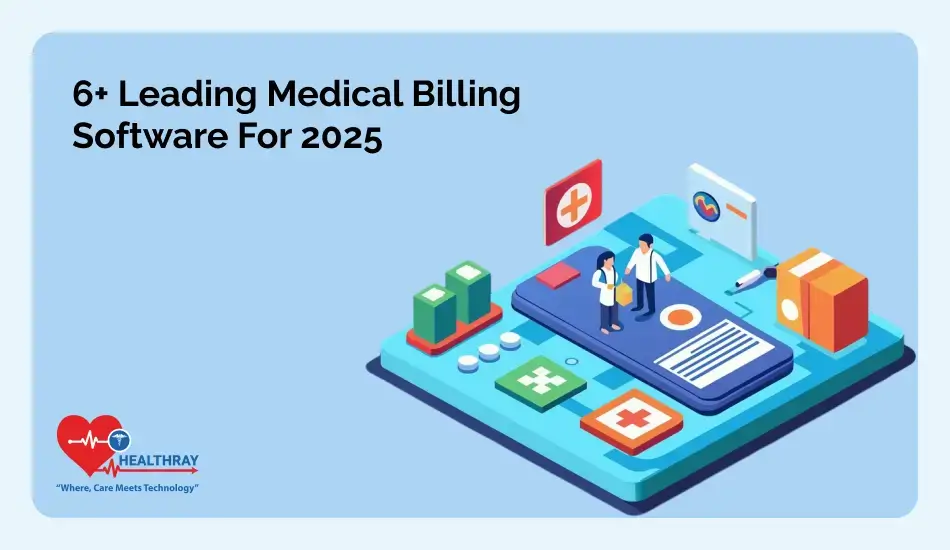Artificial Intelligence (AI) is becoming a vital tool in transforming healthcare operations. Hospitals and clinics increasingly rely on Hospital Management Information Systems (HMIS) to streamline processes, manage patient data, and improve overall efficiency. However, as healthcare demands grow, traditional HMIS solutions often struggle to keep up with the need for real-time analytics, precision, and adaptability.
This is where AI steps in. By enhancing HMIS capabilities, AI helps healthcare administrators manage resources more effectively, enables IT managers to secure and scale systems efficiently, and supports doctors in making informed clinical decisions. For software developers, it opens up possibilities to create smarter, modular systems tailored to healthcare needs.
This post will explore how AI can revolutionize Hospital Information Management Systems for hospitals and clinics. We’ll break down the benefits for different stakeholders, practical applications, and strategies for seamless integration. Whether you’re a healthcare administrator, IT manager, developer, or doctor, you’ll find insights tailored to your role.
What is HMIS Software and Why Does it Need Optimization?
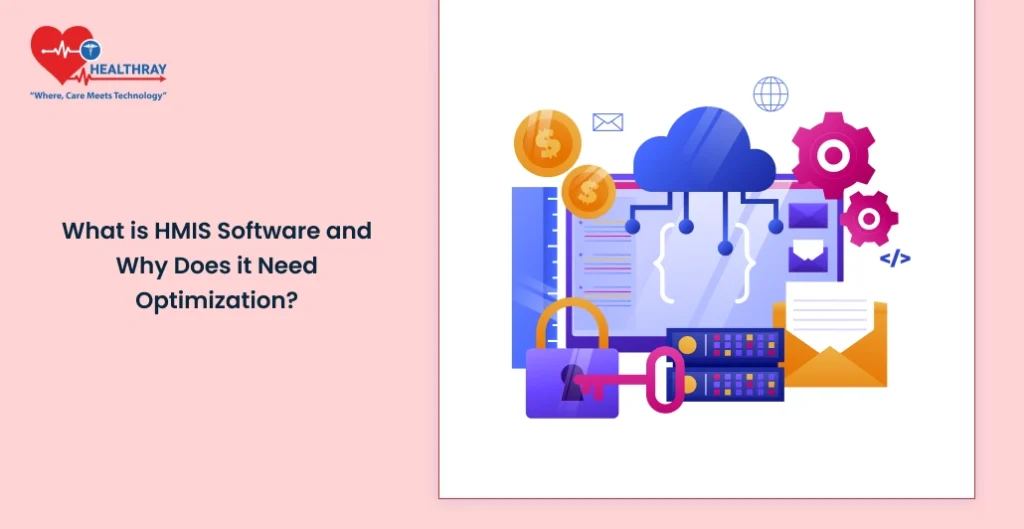
Hospital Management Information Systems (HMIS) are the backbone of modern healthcare facilities. They are designed to manage patient records, streamline administrative tasks, and support operational efficiency. From scheduling appointments to tracking inventory, HMIS plays a critical role in ensuring that hospitals and clinics run smoothly.
However, many traditional HMIS systems face challenges that limit their effectiveness. These include:
- Data Overload: Healthcare facilities handle enormous volumes of data. Traditional HMIS systems often lack the ability to process this information efficiently, leading to delays and inaccuracies.
- Limited Interoperability: Older systems struggle to integrate with other technologies like Electronic Medical Records (EMRs), billing software, and diagnostic tools, creating silos of data.
- Slow Adaptation to Change: With rapidly evolving healthcare needs, static systems can’t keep up with the demand for real-time decision-making and personalized patient care.
- Manual Errors and Inefficiencies: Reliance on manual processes for tasks like scheduling or inventory management can result in errors, wasted resources, and operational inefficiencies.
Optimizing HMIS with AI addresses these limitations. AI-powered systems can analyze data in real time, automate repetitive tasks, and provide actionable insights for better decision-making. This transformation not only enhances the performance of HMIS but also improves patient outcomes and operational efficiency.
Key Benefits of AI Integration in HMIS
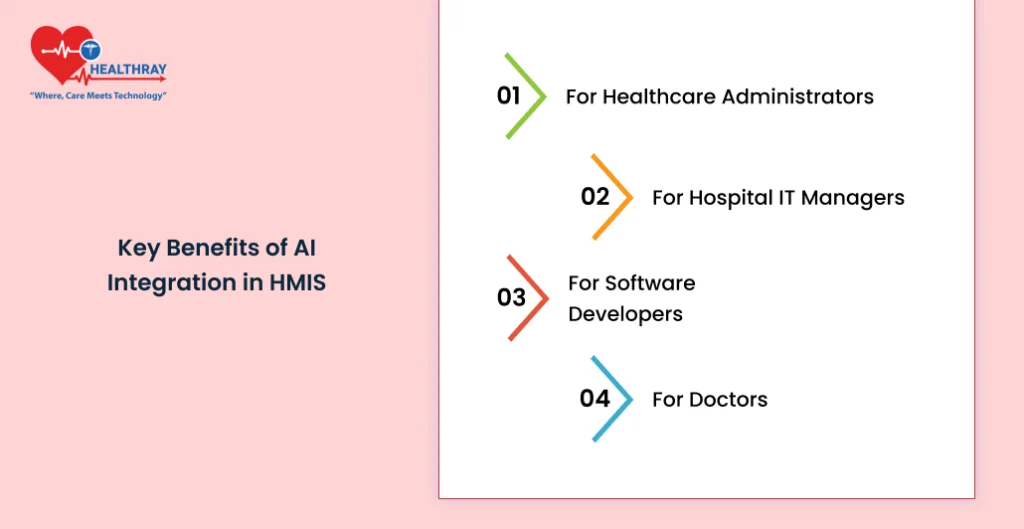
Integrating AI into HMIS Software brings value to everyone involved in healthcare operations. From administrators to doctors, each stakeholder benefits uniquely from this transformation.
For Healthcare Administrators
- Resource Optimization: AI tools analyze patient volumes, staffing needs, and resource usage to ensure hospitals operate efficiently without overextending budgets.
- Cost Savings: Automating administrative tasks reduces the need for manual labor, saving time and money while minimizing human errors.
- Improved Decision-Making: AI provides actionable insights by processing historical and real-time data, helping administrators plan better for future needs.
For Hospital IT Managers
- Enhanced Security: AI detects anomalies and potential threats in real time, protecting sensitive patient data from cyberattacks.
- System Reliability: Predictive maintenance powered by AI identifies and resolves issues in the HMIS before they escalate into significant disruptions.
- Scalability: AI-based systems are designed to grow with a facility’s needs, easily integrating new technologies or handling increased workloads.
For Software Developers
- Smarter Solutions: AI enables the creation of intelligent features, such as predictive analytics, automated scheduling, and decision-support tools.
- Customizability: Developers can design modular systems tailored to the specific needs of different hospitals and clinics.
- Future-Proofing: Incorporating AI ensures that software remains relevant in a fast-evolving healthcare landscape.
For Doctors
- Better Clinical Decisions: AI analyzes patient data to suggest treatment plans, flag potential risks, and predict outcomes, helping doctors make informed choices.
- Reduced Administrative Burden: Automating tasks like note-taking or test order processing frees up time for patient care.
- Improved Patient Outcomes: AI-driven insights, like early detection of complications, enhance the quality of care provided.
From cost savings to enhanced decision-making, AI makes HMIS a more powerful tool for hospitals and clinics. Its impact stretches across departments, improving both operational efficiency and the patient experience.
AI Applications in HMIS
Artificial Intelligence (AI) is reshaping Hospital Management Information Systems (HMIS) by automating processes, analyzing data in real time, and enabling smarter decision-making. Below are some key applications that demonstrate how AI enhances the capabilities of HMIS:
Predictive Patient Management
AI-powered systems can analyze historical data to predict patient admission trends. Hospitals can use these predictions to allocate beds, staff, and resources more effectively. For example, during flu season, AI models can forecast increased patient volume, helping administrators prepare in advance.
Automated Scheduling
Managing schedules for doctors, nurses, and patients can be complex. AI tools streamline this process by analyzing availability, patient needs, and workload distribution. This ensures optimal use of resources and reduces appointment wait times.
Inventory and Supply Chain Optimization
AI helps hospitals track inventory levels for critical supplies like medications and surgical tools. By analyzing usage patterns, it can predict when restocking is necessary, preventing shortages or overstocking.
Real-Time Reporting and Analytics
AI enables real-time monitoring and reporting of hospital operations. Dashboards powered by AI offer insights into key metrics such as patient flow, resource utilization, and financial performance. This allows administrators to act quickly on emerging trends.
AI-Powered Chatbots
Hospitals increasingly use chatbots to assist patients with appointment bookings, prescription refills, and general inquiries. These AI-driven virtual assistants reduce administrative workload and enhance patient engagement.
Clinical Decision Support
AI can process patient data to provide doctors with data-driven treatment recommendations, flag potential drug interactions, or highlight early signs of complications. This helps improve diagnostic accuracy and treatment outcomes.
Fraud Detection and Billing
AI algorithms monitor billing processes to detect inconsistencies or suspicious patterns, reducing financial losses due to fraud or errors.
Personalized Patient Care
AI systems analyze individual patient data to tailor care plans, ensuring treatments align with a patient’s specific medical history and conditions.
By integrating AI in Hospital Information Management Systems, hospitals and clinics can achieve a level of efficiency and precision that was previously unattainable. Each of these applications directly addresses the challenges faced by healthcare facilities, helping them deliver better care with fewer resources.
Challenges and Considerations
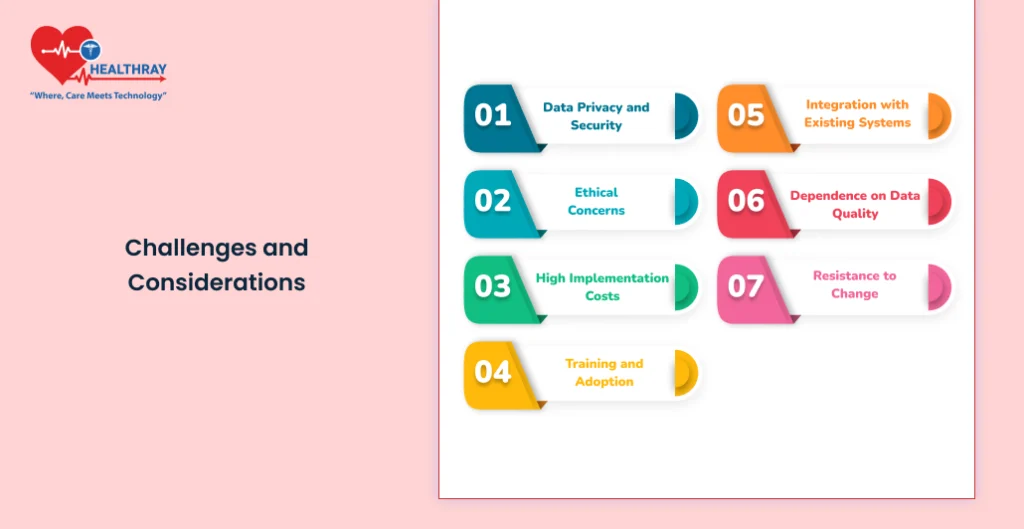
While integrating AI into Hospital Management Information Systems (HMIS) offers immense potential, it also comes with challenges that healthcare facilities need to address. Proper planning and awareness of these hurdles can ensure a smoother transition and long-term success.
Data Privacy and Security
AI systems require access to vast amounts of patient data to function effectively. This raises concerns about protecting sensitive information from breaches. Ensuring compliance with healthcare data regulations like HIPAA or GDPR is essential to maintain patient trust and legal accountability.
Ethical Concerns
AI models can sometimes reflect biases in the data they’re trained on. For example, predictive tools may inadvertently favor specific demographics over others, leading to disparities in care. Ethical oversight is crucial to ensure AI applications promote fairness and equity.
High Implementation Costs
Introducing AI into HMIS involves substantial initial investment. From upgrading infrastructure to hiring skilled professionals, the costs can be significant. However, many facilities recover these expenses through long-term savings and improved efficiency.
Training and Adoption
Staff at all levels—administrators, IT teams, and medical professionals—must adapt to AI-driven workflows. Comprehensive training programs are necessary to help employees understand and trust the new system.
Integration with Existing Systems
Legacy HMIS platforms may not easily integrate with AI technologies. Ensuring seamless communication between old and new systems requires careful planning and possibly custom development.
Dependence on Data Quality
AI’s effectiveness depends heavily on the quality of data it receives. Inconsistent or incomplete records can lead to inaccurate predictions and decisions. Implementing data validation and standardization practices is critical.
Resistance to Change
Introducing AI can create resistance among staff who may fear job displacement or feel overwhelmed by new technology. Open communication, demonstrations of AI’s benefits, and involving staff in the implementation process can help mitigate this issue.
Despite these challenges, the benefits of AI in HMIS outweigh the drawbacks when implemented thoughtfully. By addressing these considerations early, hospitals and clinics can maximize the impact of AI on their operations and patient care.
How to Successfully Implement AI in HMIS
Introducing AI into Hospital Management Information Systems (HMIS) requires strategic planning and execution. Hospitals and clinics can maximize the benefits of AI while minimizing disruptions by following a clear roadmap.
Assess Needs and Set Goals
Start by identifying the pain points in your current HMIS and setting clear objectives for AI integration. Are you aiming to streamline scheduling, improve patient outcomes, or enhance data security? Defining your goals ensures a focused approach.
Choose the Right AI Tools
Not all AI solutions are created equal. Select tools that align with your organization’s specific needs. For instance, predictive analytics might be ideal for resource planning, while natural language processing could improve patient communication systems.
Build a Collaborative Team
Successful implementation requires input from various stakeholders:
- Healthcare administrators: To align AI capabilities with organizational goals.
- IT managers: To oversee technical integration and security.
- Doctors and staff: To ensure the system supports clinical workflows.
- Software developers: To customize and optimize the HMIS.
Plan for Seamless Integration
Integrating AI into an existing HMIS can be challenging. Work with your IT team to ensure compatibility with legacy systems. Pilot testing new features on a smaller scale before a full rollout can help identify and resolve issues early.
Focus on Training and Support
Training is crucial for ensuring staff adoption. Provide hands-on sessions and resources to help employees understand how to use the new system. Assign dedicated support teams to address questions and concerns during the transition.
Prioritize Data Quality
AI relies on accurate and comprehensive data to perform effectively. Audit your existing records for inconsistencies or gaps, and implement standardized data collection practices moving forward.
Address Ethical and Regulatory Considerations
Comply with healthcare data privacy regulations like HIPAA or GDPR. Establish an ethics committee to review AI algorithms for potential biases and ensure transparency in decision-making.
Monitor and Iterate
AI systems require continuous monitoring to ensure they’re meeting expectations. Collect feedback from users and use analytics to measure the impact of AI on hospital operations. Make iterative improvements to optimize performance.
Communicate Benefits to Stakeholders
Address concerns about job displacement or increased workloads by showcasing the tangible benefits of AI. Highlight how it reduces administrative burdens, improves patient outcomes, and creates opportunities for upskilling.
By taking these steps, hospitals and clinics can implement AI in HIMS Software with confidence. This structured approach ensures a smoother transition and maximizes the return on investment.
Future Trends in AI and HMIS
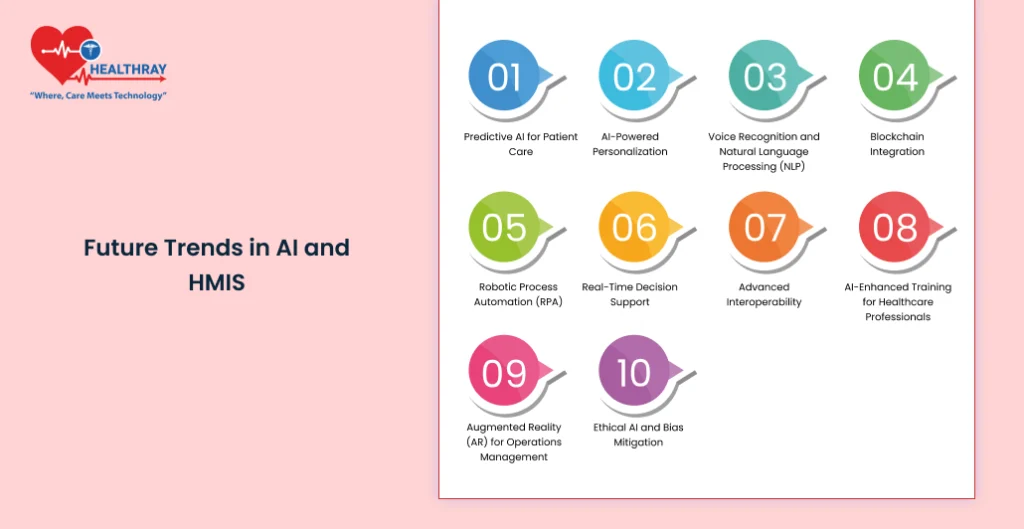
As healthcare continues to evolve, Artificial Intelligence (AI) is poised to play an even greater role in optimizing Hospital Management Information Systems (HMIS). These emerging trends highlight the transformative potential of AI in the years to come:
Predictive AI for Patient Care
AI-powered HMIS systems will leverage predictive analytics to anticipate patient needs. From forecasting patient admissions to predicting disease outbreaks, these tools can help healthcare facilities prepare proactively.
AI-Powered Personalization
Future HMIS platforms will use AI to deliver highly personalized care. By analyzing patient history, genetic data, and real-time health metrics, systems can recommend customized treatment plans tailored to individual needs.
Voice Recognition and Natural Language Processing (NLP)
Advancements in voice recognition will allow doctors and nurses to interact with HMIS systems hands-free. NLP will enable systems to interpret unstructured data, such as doctor’s notes, making it easier to extract actionable insights.
Blockchain Integration
AI and blockchain together could revolutionize data security in HMIS. Blockchain’s decentralized nature ensures tamper-proof records, while AI analyzes and organizes data for better usability.
Robotic Process Automation (RPA)
AI-driven automation tools will take over repetitive tasks like billing, claims processing, and patient follow-ups. RPA will save time and reduce the chances of human error.
Real-Time Decision Support
Future AI systems will offer real-time decision-making support by analyzing patient data on the fly. This can significantly improve outcomes in critical situations like emergency care.
Advanced Interoperability
AI will drive improved interoperability between HMIS and other healthcare systems. Seamless data exchange between electronic medical records (EMRs), diagnostic tools, and wearable devices will create a unified healthcare ecosystem.
AI-Enhanced Training for Healthcare Professionals
AI-driven simulations and virtual reality (VR) platforms will help train healthcare workers more effectively. By integrating these tools into HMIS, hospitals can enhance staff readiness and performance.
Augmented Reality (AR) for Operations Management
AR combined with AI will allow administrators and clinicians to visualize hospital operations in real time. For example, AR dashboards could display live patient flow or inventory status, helping facilities operate more efficiently.
Ethical AI and Bias Mitigation
The future will focus on developing ethical AI systems that address biases and prioritize transparency. Hospitals will invest in tools that allow them to audit AI algorithms and ensure equitable care.
The integration of these advancements into HMIS will further elevate healthcare delivery, improve operational efficiency, and enhance the overall patient experience. Facilities that adopt these trends early will be well-positioned to lead the future of healthcare.
Conclusion
Artificial Intelligence is reshaping the way hospitals and clinics operate by enhancing the capabilities of the Hospital Management System. From predictive analytics and personalized care to advanced automation, AI enables healthcare facilities to provide better patient experiences while streamlining their operations.
For healthcare administrators, AI brings tools to optimize resources and cut costs. IT managers benefit from enhanced security and system reliability. Software developers gain the ability to design smarter, adaptable solutions, while doctors receive valuable insights to improve clinical decisions.
Although implementing AI in HMIS comes with challenges like integration complexities, ethical concerns, and training needs, the long-term benefits make the investment worthwhile. Facilities that embrace AI-powered systems will not only stay ahead of the curve but also set new standards for efficiency and care quality.
The future of AI in HMIS promises even more exciting advancements. Whether it’s real-time decision support, personalized treatment plans, or enhanced interoperability, AI is the key to unlocking the full potential of modern healthcare systems.
